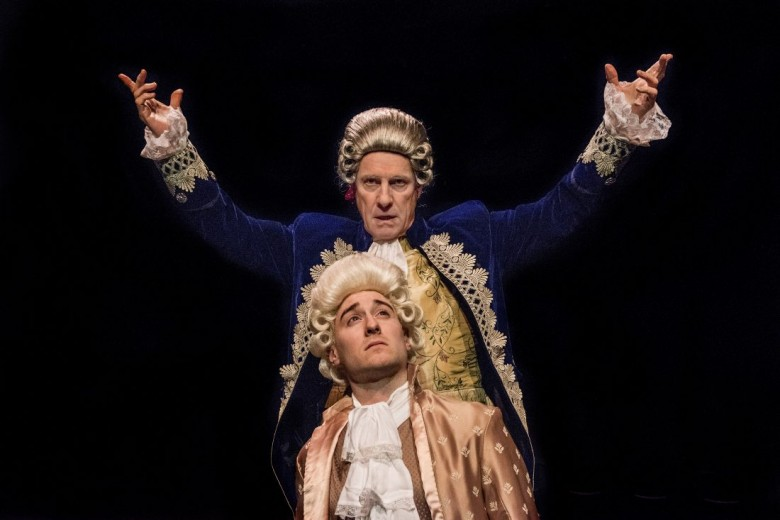Collaborations often provide an opportunity to create a whole greater than the sum of its parts, with each member amplifying the gifts of the others. But when those involved possess the stellar talents of the Irish Classical Theatre Company and the JoAnn Falletta-led Buffalo Philharmonic Orchestra, and the script of a Tony award-winning play and an Academy award-winning film, the end result can only be breathtakingly memorable!
In the expansive space of Kleinhans Music Hall, Amadeus by the Irish Classical Theatre Company and the Buffalo Philharmonic Orchestra provided an opportunity to experience the many layers that form this play, layers that would not be so discernable in a smaller theatrical setting without a full orchestra.
Directed by Fortunato Pezzimenti, the play is one of revenge against that incomprehensible Divine incandescence that flows seemingly effortlessly through one singular human being out of all the rest. PJ Tighe, as the young Wolfgang Amadeus Mozart, is the innocent recipient of this blessing. Vincent O’Neill as composer Antonio Salieri, swiftly transforms into the vindictive, envious man of hate in the presence of it. He can only observe Mozart’s Divine genius…he cannot possess it. And what he cannot posses, he chooses to destroy.
And what an enchanting Mozart PJ Tighe provides! Energetic, joy-filled, unabashedly vulgar and ever spontaneous, he flutters through scenes with contrasting bursts of elegant intellectual brilliance and childlike effervescence. In stark contrast to Salieri’s assertively mannered, contrived, sterile artificiality, we see Mozart as one who is truly alive.
Vincent O’Neill’s performance as Salieri exudes all the authority of one who assumes he is not simply brilliant beyond words, but entitled to be so. He believes his relationship with his god is his proof. As the play progresses, we hear the orchestra exquisitely prove to him and us that his assumptions are not only mistaken, but painfully delusional. O’Neill allows his character to be tenderly, reverently in awe of the transcendent dream of K 361, while we listen, with all hearts agreeing. Then jealousy reforms him, and he moves with a hateful spine.
And this continues throughout the play, for not only is Salieri’s mind flooded with fragments of sublime score after score, thus deepening his rage, but the expanse of the Hall is, as well. With Mozart’s music fully alive in every cell of our bodies, we easily understand the magnitude of Salieri’s pain, as well as his wrath. While great beauty can raise us to spiritual heights, it simultaneously exposes all that is unlike itself. Salieri allows the golden ring of joy-filled appreciation to slip off his finger, and leave him a barren bitter man.
The high moment of the evening when the power of the collaboration was extraordinarily triumphant occurred when Solieri declares God his enemy. As O’Neill releases his wrath against God’s betrayal and takes justice into his own hands, the orchestra and magnificent chorus sound the glory of the Kyrie from K417. Kyrie Eleison…Lord have mercy…thunders again and again through our arteries, stirring our life force while releasing its poignant power. Mozart’s cry for compassion becomes Salieri’s call for destruction.
As the impoverished Mozart later swoons to his death in the arms of his beloved Costanze, played both sweetly and with womanly strength by Kathleen Marcari, he dies unaware of the magnitude of his legacy, or the triumph of his immortality. Behind him, the very musicians and instruments that would make Mozart immortal play for us the soul-expanding 4th movement of the Symphony No. 41, “Jupiter," and divine justice smiles upon one and all.
The supporting cast of Anthony Alcocer, Ray Boucher, Elliot Fox, David Lundy and Doug Weyand, all loaned their charm and impeccable wit, sending smiles throughout the Hall. Members of the Buffalo Philharmonic Chorus, directed by Adam Luebke, also contributed to the performance, specifically soloists Kevin Cosbey, Daniel Johnson, Timothy Lane and Sarabeth Matteson.
Theatre Review by Manya Fabiniak

